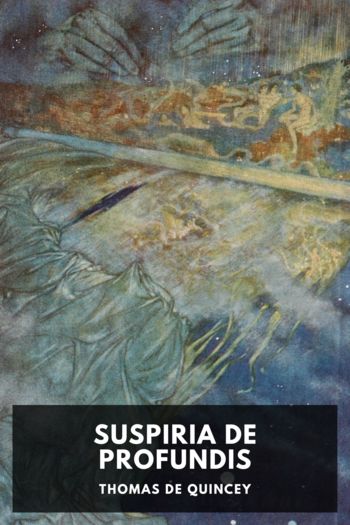Suspiria de Profundis by Thomas De Quincey (urban books to read .TXT) 📕

- Author: Thomas De Quincey
Book online «Suspiria de Profundis by Thomas De Quincey (urban books to read .TXT) 📕». Author Thomas De Quincey
But the third Sister, who is also the youngest—! Hush! whisper whilst we talk of her! Her kingdom is not large, or else no flesh should live; but within that kingdom all power is hers. Her head, turreted like that of Cybele, rises almost beyond the reach of sight. She droops not; and her eyes, rising so high, might be hidden by distance. But, being what they are, they cannot be hidden: through the treble veil of crape which she wears the fierce light of a blazing misery, that rests not for matins or for vespers, for noon of day or noon of night, for ebbing or for flowing tide, may be read from the very ground. She is the defier of God. She also is the mother of lunacies, and the suggestress of suicides. Deep lie the roots of her power; but narrow is the nation that she rules. For she can approach only those in whom a profound nature has been upheaved by central convulsions; in whom the heart trembles and the brain rocks under conspiracies of tempest from without and tempest from within. Madonna moves with uncertain steps, fast or slow, but still with tragic grace. Our Lady of Sighs creeps timidly and stealthily. But this youngest Sister moves with incalculable motions, bounding, and with tiger’s leaps. She carries no key; for, though coming rarely amongst men, she storms all doors at which she is permitted to enter at all. And her name is Mater Tenebrarum—our Lady of Darkness.
These were the Semnai Theai or Sublime Goddesses,47 these were the Eumenides or Gracious Ladies (so called by antiquity in shuddering propitiation), of my Oxford dreams. Madonna spoke. She spoke by her mysterious hand. Touching my head, she beckoned to Our Lady of Sighs; and what she spoke, translated out of the signs which (except in dreams) no man reads, was this:—
“Lo! here is he whom in childhood I dedicated to my altars. This is he that once I made my darling. Him I led astray, him I beguiled; and from heaven I stole away his young heart to mine. Through me did he become idolatrous; and through me it was, by languishing desires, that he worshipped the worm, and prayed to the wormy grave. Holy was the grave to him; lovely was its darkness; saintly its corruption. Him, this young idolater, I have seasoned for thee, dear gentle Sister of Sighs! Do thou take him now to thy heart, and season him for our dreadful sister. And thou,”—turning to the Mater Tenebrarum, she said—“wicked sister, that temptest and hatest, do thou take him from her. See that thy sceptre lie heavy on his head. Suffer not woman and her tenderness to sit near him in his darkness. Banish the frailties of hope; wither the relenting of love; scorch the fountains of tears; curse him as only thou canst curse. So shall he be accomplished in the furnace; so shall he see the things that ought not to be seen, sights that are abominable, and secrets that are unutterable. So shall he read elder truths, sad truths, grand truths, fearful truths. So shall he rise again before he dies. And so shall our commission be accomplished which from God we had—to plague his heart until we had unfolded the capacities of his spirit.”
The Solitude of ChildhoodAs nothing which is impassioned escapes the eye of poetry, neither has this escaped it—that there is, or may be, through solitude, “sublime attractions of the grave.” But even poetry has not perceived that these attractions may arise for a child. Not, indeed, a passion for the grave as the grave—from that a child revolts; but a passion for the grave as the portal through which it may recover some heavenly countenance, mother or sister, that has vanished. Through solitude this passion may be exalted into a frenzy like a nympholepsy. At first, when in childhood we find ourselves torn away from the lips that we could hang on forever, we throw out our





Comments (0)